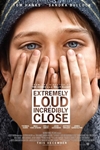- REVIEW
- READER REVIEWS
Extremely Loud & Incredibly Close
|
(No longer in theaters)
|
|
Genre
Drama
Producer
Scott Rudin
Distributor
Warner Bros. Pictures
Release Date
Dec 25, 2011
Release Notes
Limited
Official Website
Review
Never lacking nerve, novelist Jonathan Safran Foer leaped on the opportunity presented by 9/11 for his messy Extremely Loud & Incredibly Close, which weds a modern American trauma to themes he explored in Everything Is Illuminated. There are multiple narrators, but the central figure is 9-year-old Oskar Schell, struggling to live through the loss of his dad, Thomas, in the World Trade Center. Thomas devised puzzles and scavenger hunts to force his fearful son out into the world, and Oskar becomes convinced there’s a vital message at the finish line of his dad’s final challenge. Broken or cryptic communications between damaged parents and kids show up all through the book, along with memories of Dresden and, more gratuitously, Hiroshima. I often wished Oskar’s turns of phrase (and insistence on wearing white and carrying a tambourine) were less cute, until I realized that cute is Foer’s mode of rhetoric—and when it works, he finds sneakily poetic ways of evoking our longing for a lost past.
Stephen Daldry’s film eliminates the other perspectives, along with some of the boy’s irritating tics (i.e., the white wardrobe), and homes in on a middle ground between jumpy postmodernism and Oscar-bait uplift. He succeeds, although once he strips away the gimmicks and appends an inspirational ending, what’s left is a tearjerker that doesn’t fully earn the right to use such terrible images. The first thing onscreen—a body falling in slow motion—made me want to flee: too much horror too fast. The other wrenching device is a series of six answering-machine messages left by Thomas (Tom Hanks) from the burning tower, his assurances increasingly unconvincing. For reasons only later apparent, Oskar (Thomas Horn) replaces the machine and lies to his mother (Sandra Bullock). It’s the final message he can’t share, and it’s withheld from us, too—an emotional striptease—until the end. Yes, it’s very bad, and not for the reason we’ve anticipated.
Thomas Horn, discovered on a Jeopardy! teen tournament, has to carry the picture, and he’s not really an actor—more of an intelligent reciter. Fortunately, Oskar is an overintellectualizer, lacking in affect. When he finds a key in an envelope in his father’s closet bearing the word “Black,” Oskar decides to visit every “Black” in the New York phone book. The parade of Blacks—young and old, of many races and dispositions—is fairly tedious, but Chris Menges’s cinematography gives every neighborhood its own character. Best of all, the boy is accompanied in later visits by a mute, elderly man known as the Renter, a guest in the apartment of Oskar’s grandmother (Zoe Caldwell).
The Renter’s muteness is accounted for at length in Foer’s book, but here it’s just a given and would be terribly precious (he communicates by writing on pads, except for “Yes” and No,” which are tattooed on his palms) if he weren’t played by Max von Sydow. There’s a bit of Chaplin in his walk and Stan Laurel in his weary shrugs, but Von Sydow makes this man his own: an irreducible mixture of chastened father and lost child. The other actors aren’t as lucky—they have dialogue—but Hanks makes you miss him when he’s gone, and Bullock gets a good final scene when she lets Oskar know that he has never been as alone as he thought. But the question hangs: Does this artificial, three-hankie scenario justify its 9/11 appropriations? Dry your eyes and decide for yourself.
